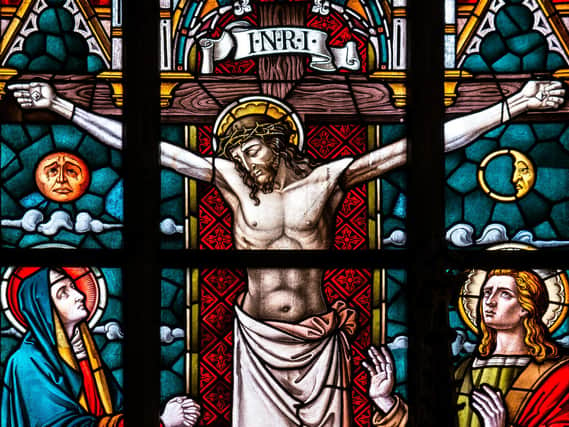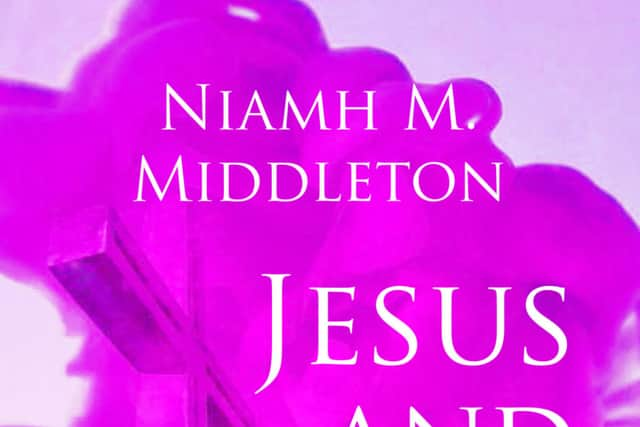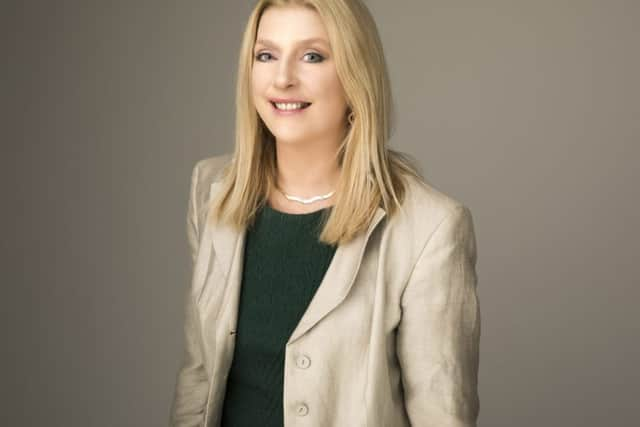Must read of the week: Jesus and Women: Beyond Feminism


This article contains affiliate links. We may earn a small commission on items purchased through this article, but that does not affect our editorial judgement.
Jesus and Women: Beyond Feminism by feminist theologian Dr Niamh M. Middleton provides a long-overdue dissection of institutional sexism within the Church, and how women must lead the way in restoring gender equality. This is an essential read for all Christians, and anyone concerned with the question of gender equality.
By Timothy Arden
Recent decades in Britain have been witness to a dramatic social change, with the nation rapidly transitioning from a faith-based society to post-religious secularism.
The situation is now so dire that, according to the British Social Attitudes (BSA) survey, only one per cent of people aged 18-24 now identify as Church of England.
The same study found that the number of people identifying as Christian has fallen by nearly half since the 1980s while more than 50 percent of the public now say they do not belong to any religion at all.
Christianity, then, is clearly a religion in crisis, marked by the ongoing dwindling of congregations, both within the Catholic and Protestant Churches.
The reasons for this are complex but one of the biggest impactors must be the institutional sexism of the Church, which has been deeply embedded within its power structure for almost—but not quite—as long as Christianity has existed.
This outrageous sense of male chauvinism, of gender-based discrimination and masculine privilege, has largely been stamped out of wider society as it strives towards true equality, and in the #MeToo era has been publicly called out and decried within those sectors that have been slow to catch up, such as the entertainment industry.
Yet despite this, it still finds sanctuary within one institution: the Christian Church.
The Catholic Church is the worst offender in this regard, with its continued prohibition on female priests, but the Church of Anglican is certainly not free from sin. This stubborn refusal to move with the times has, understandably, alienated women, and has led them to turning their backs upon organised religion—a critical blow, given that it has always been women who have been the main torchbearers for faith, who have baptised their children into the faith, and who have made sure their families attend church each week.
This pressing and timely issue is the focus of fascinating new book Jesus and Women: Beyond Feminism, which has just been released in paperback through The Lutterworth Press.
Its author, theologian and retired Dublin City University academic Dr Niamh M. Middleton, has been at the forefront of calls for Church reform, adding her voice to those of a multitude of Christian scholars, both male and female, around the world.
It is the resistance, bordering on outright dismissal, that these pleas for gender equality have met with within the Church hierarchy that is, no doubt, the driving force for her book, which offers an engrossing, incisive dissection of Church sexism fuelled by righteous indignation.
Women and Jesus is part theological criticism, part social critique, combined with history and science. Fascinating and educational wherever you sit in the spiritual spectrum, every chapter contains a salvo of sound reasoning.
Every argument is backed by impressive biblical research but, importantly, is written in a clear, understandable way that everyone can readily grasp without any prior familiarity with religious scripture, history or dogma.
Its core concept is that the outmoded stance of the Christian Church concerning gender equality is fundamentally unchristian, because it is in stark contrast to the teaching of its founder, Jesus Christ.
As Dr Middleton demonstrates abundantly, supported by a wealth of Bible passages, Jesus displayed an inclusive attitude towards women, seeing them as just as worthy and spiritual as male brethren.
You could, in a sense, declare him the first feminist, extolling the virtues of femininity at a period in history when they were largely regarded as the inferior sex, viewed with suspicion, with disgust, and treated as little more than objects to possess.


Dr Middleton explains how, in ancient Judea, women were controlled through an imbalanced legal code that forbade them to engage in premarital sex or adultery, and them alone. Men, essentially, could do as they please.
While constrained by how far he could go to challenging the status quo, for fear of bringing violent reprisals onto his female followers—of which there were many—he did defend women, and celebrated them and female qualities in his teachings.
The author surmises that it was only due to the social backlash and real danger that could befall his female disciples that prevented Jesus from appointing any women apostles.
That being said, Dr Middleton argues persuasively that disciple Mary Magdalene—who is said to have been the first person to whom Jesus appeared after his resurrection—can be considered the ‘apostle to the apostles’.
As she explains, the risen Christ told Mary to go to his male disciples and tell them the good news of his resurrection. This, she says, was the turning point of Christianity, changing it from a small reformist Jewish movement into a new religion that would eventually become the world’s largest.
So Mary Magdalene, as the first disciple sent to proclaim the message of Christianity, was not only the ‘apostle to the apostles’ but also the embodiment of the Church in the period between her encounter with Jesus and her meeting with his other disciples.
Jesus and Women proceeds to explain how Jesus’ singular appreciation of women sprang from his divine consciousness and ‘agape’ (unconditional love), which is one of the bedrocks of Christianity.
In the years following Jesus’ crucifixion, the Christian Church rapidly took root in the Holy Land and, for a short time, it remained true to its founder’s values, allowing women the equal right to participate in, and lead, worship alongside male members.
This only came to change in the decades and centuries thereafter, when those in charge of the rapidly-swelling Church began making concessions to local prejudices to aid its establishment in new territories.
This great betrayal, more a matter of politics than spirituality, was shamefully fixed into the Church’s identity when it was embraced by the Roman Empire. The emperors saw Christianity as an excellent way to control women, subverting divine truth into social propaganda, and set the precedent for the long-standing collusion between Church and State.


This historical context is easy to digest and vital to grasp why today’s Church is so regressive in its views concerning women.
Dr Middleton adds to this discussion through illuminating reference to evolutionary biology—another area of expertise, and which was covered in detail in her 2019 book Homo Lapsus—that reveals that the male competition for mates led them to gather wealth, land, and power, using organised religion as a tool to this selfish end.
Her book exposes the sinister ways that Christianity has been used as a force for repression. For instance, the celebration of the Virgin Mary’s virginity can be construed as a way to shame women and their sexual desires.
So, for more than one millennium, religion and the State have joined together to keep men in charge and women in subservience, being the breeding ground for discrimination, intolerance and oppressive vehicles such as adultery laws and FGM.
In a later section of the book, Dr Middleton puts forward her argument that Princess Diana is a modern-day victim of this wicked union and double-standard. While she was expected to be a virgin before marriage, her future husband, Prince Charles, was not held to such obligations, being associated with a string of women in his playboy days.
And as the wife of royalty, Diana was expected to put up with her husband’s infidelity. When she dared to break free, she was publicly pilloried for it, and this incessant hounding was a contributing factor to her tragic death in 1997.
Dr Middleton, then, positions the Queen of Hearts in a new way, as a feminist martyr and, perhaps the first #MeToo icon.
By the time you finish the book, your blood will no doubt be boiling over the inexcusable treatment that women have received, and the discrimination they continue to face by those worthies supposedly upholding God’s teachings.
The author’s purpose is simple—to present a clarion call to all Christian women to rise and reclaim the Church they have been promised, and which is rightfully theirs.
Time and again, she demonstrates how the Bible supports this position, even right back to the Old Testament’s Book of Genesis, where Adam and Eve were gifted joint dominion over the world.
It is only the male gaze that has distorted this vision of social parity and if the Church is to endure for millennia to come then the message is clear: women must take their equal place within the Church hierarchy to transform the Church into an institution fit to receive them.
In conclusion, Jesus and Women provides a bold and brilliant multi-disciplinary assessment of an age-old problem, taking an intellectual and irresistible battering ram to any remaining notions of male superiority.
While society continues to progress in its battle of the sexes, the time has come for women to make a stand and usher in a revolution of grace that will restore gender harmony within the last bastion of prejudice.
Jesus and Women: Beyond Feminism by Niamh M. Middleton is available now via Amazon UK, priced £20 in paperback, £14.46 as an eBook and £57.28 in hardcover. The book can also be purchased directly from The Lutterworth Press. For more information visit www.niamhmiddletonauthor.com
EXCLUSIVE Q&A INTERVIEW WITH DR NIAMH M. MIDDLETON
We speak to feminist theologian Dr Niamh M. Middleton, author of Jesus and Women: Beyond Feminism, to find out more about her explosive new book, her research on the roots of the Church’s inherent sexism, and the answer to this age-old problem.


Q: Your new book, Jesus and Women, has been praised for highlighting the woeful gender-based inequality within the Church. This of course, is not a new issue so why did you decide to address it now?
A: As I point out in my book, a combination of insights from evolutionary biology, feminism and the #MeToo movement facilitates a new perspective on the Gospels that highlights the revolutionary attitude of Jesus towards women in a way that illuminates the way forward for them in both the Church and society. It also highlights how the Church’s inherently sexist treatment of women is strikingly at odds with their treatment by its founder and cannot be maintained if the Church is to survive.
Q: What do you hope your book will achieve in the wider discourse on such inequality?
A: I hope it will make a significant contribution to the elimination of gender inequality in the public sphere as well as in the Church. While women in the West have gained significant rights and freedoms in comparison to the women of other cultures, the recent #MeToo movement has demonstrated that we still have a long way to go. Indeed, it can be argued that the freedoms we have gained have brought us to a phase in our journey towards equality that permits deeper insights than were possible before into the patriarchal power structures of society. Although institutional Christianity is far more patriarchal and sexist than the secular sphere, my research has convinced me that feminism as a movement could only have arisen in a Judaeo-Christian culture. Evolutionary biology has demonstrated how religion and politics evolved in tandem with one another as a means of creating male patriarchal power structures to support male domination of the world and of women.
Religions in particular tend to be used as a force for the social control of women by reinforcing the various double standards that constrain them from attaining their full potential as persons. For this reason a distinction must always be made between religion as a phenomenon and the unique characteristics of individual religions while they are still under the control of their founders.
Interestingly, there are Christian theologians who argue that the rights and freedoms gained by women in the Christian West are due to the revolutionary attitude of Jesus towards women as depicted in the Gospel texts. The status of women in the early Church reflected their treatment by its founder; in the Pauline church communities women shared the same ministries as those of men, including supervision of the Eucharist. Once Christianity became the state religion of the Roman Empire this situation dramatically regressed, although unlike in other religions women were never segregated from men but were allowed into church buildings on an equal basis. It’s argued by theologians that equal female participation in church masses and services worked its way outwards into secular Christian societies and eventually resulted in the gaining of female secular rights and freedoms. I am hoping that my book will enable Western women to appreciate the vital role of Christianity in the achievement of their freedoms and encourage Christian women to campaign for the restoration of their early Christian church status in order to also gain full equality in the public sphere.
Q: Given that the hierarchies of religious institutions have traditionally been a male preserve, do you think it is realistic to believe they will be willing to reform?
A: Roman Catholicism, the founding and largest denomination of Christianity, is without doubt the most patriarchal institution in the Western world. Although many denominations of the Reformed tradition permit female ordination, it remains controversial. The massive fall off in female Church attendance in Roman Catholicism is largely due to its refusal to accord women any authority in the Church, and there are liberal priestly theologians and bishops who are in favour of female ordination. They are however in a minority, which is why one of my motivations for writing the book is to inspire Christian women to campaign for the reclamation of their religion. Also, while female ordination is a necessary first step in creating a church ethos that will reflect the treatment of women by its founder, other structural reforms will also be needed. In my book I argue that only women can guide and effect such reforms, which will propel the Church into a new, more spiritual phase.
Q: If these institutions do not reform willingly, do you think there should be political intervention to enforce such changes?
A: I believe that the massive fall off in female church attendance, in conjunction with female campaigning for equal authority in the Church, is bound to precipitate necessary reform.
Political intervention would do more harm than good in a Church context. One of the most necessary Church reforms is the separation of religion from politics. Their tribalistic male link has been a major cause of the unjust treatment of women in both the Church and society. As Jesus himself (whose crucifixion resulted from an unholy alliance of church and state) said: “Render unto Caesar what is Caesar’s, and onto God what is God’s”. Also, in an authentic Christian moral context, moral progress cannot be enforced, but must be willingly carried out.
Q: Given the shocking levels of inequality within the Church, as well as wider social issues where the Church could be said to be out of keeping with modern social expectations, why do you think it is important to retain such religious institutions for the future?